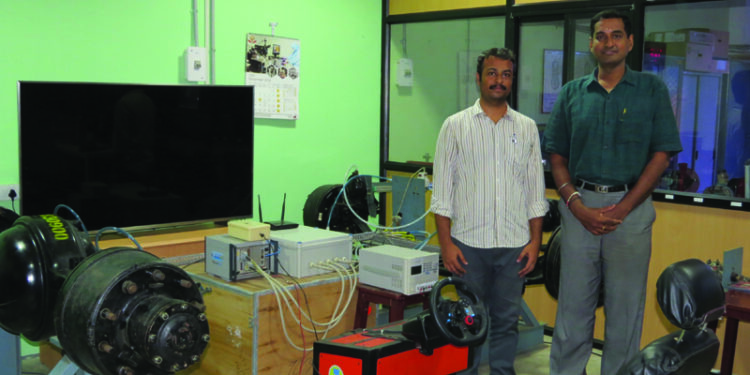NE SCIENCE & TECHNOLOGY BUREAU
CHENNAI, FEB 8
Indian Institute of Technology Madras Researchers develop strategies to improve the braking performance of electrified vehicles (Electric and Hybrid vehicles). This research could help implement a braking system in Electrified Vehicles, which can improve the stopping distance and ride comfort in the presence of regenerative braking, according to a release from IIT Chennai.
Although such strategies have been developed for lighter road vehicles, there is a lack of strategies through which the braking performance of heavy commercial road vehicles (such as buses and trucks) can be improved through ‘regenerative braking.’
The research was led by Prof. C. S. Shankar Ram, Department of Engineering Design, IIT Madras, and his PhD student Dr. V. S. Kesavan who explored various strategies to study and incorporate the effect of different dynamic characteristics of ‘friction brake’ and ‘regenerative brake’ on the vehicle’s braking performance. The results of their study have been published in the reputed peer-reviewed Journal Vehicle System Dynamics.
Highlighting the need for research in these areas, Prof. C.S. Shankar Ram, Department of Engineering Design, IIT Madras, said, “Given the increasing adoption of electrified heavy road vehicles, it is imperative to study their dynamic response during on-road operation. Brakes are used to ensure safe operation of vehicles, and this research focusses on the braking of electrified heavy road vehicles.”
There are two braking systems that are being used in electrified vehicles, namely:
- ‘Friction-based Braking System’ – In conventional fossil fuel-based heavy road vehicles the force that the driver applies on the brake pedal is used to regulate a pneumatic system whose output force is used to stop the vehicle using friction braking. The kinetic energy of the vehicle due to its moving state is converted to heat energy. Thus, a part of the energy obtained from burning the fuel is wasted in the form of heat energy dissipated during friction braking.
- ‘Regenerative Braking System’ – In electric vehicles, an arrangement is made to reduce this energy loss by using another braking system called ‘Regenerative Braking System.’ In this, when the driver presses the brake foot pedal, a portion of the kinetic energy due to the movement of wheels is converted into electrical energy that gets stored in the battery and is available for use in future driving.
However, the magnitude of regenerative braking is insufficient to stop the vehicle under all conditions since regenerative braking alone cannot typically provide high deceleration. Further, when the battery is fully charged or when vehicle speed falls below a certain level, regenerative braking is unavailable, and the total brake force on driven wheels is applied only through friction braking.
Therefore, in electrified vehicles both friction and regenerative braking should be used in a co-operative manner to ensure energy conservation and stopping the vehicle within a reasonable distance.
Electrified vehicles can get the best of both worlds through the use of such a co-operative braking system. However, a crucial part here is the decision on how the two braking systems should operate to ensure that the vehicle stops within a reasonable distance and with no jerks experienced during the shift between the two braking systems for good ride comfort.
Speaking about this Research, Prof. C. S. Shankar Ram, Department of Engineering Design, IIT Madras, said, “Due to the faster response of regenerative braking, its switch-off can cause momentary perturbations in vehicle’s deceleration and its associated vehicle dynamic parameters until the friction brake system increases its brake pressure to meet the desired brake demand from the driver. This situation disturbs the driver’s brake feel momentary due to the difference in the dynamic response characteristics of these two braking systems.”
For this study, the team tried to understand how braking performance is affected when these two braking systems are applied together or sequentially in heavy road vehicles. They further evaluated how braking performance is affected when the regenerative brake is switched off instantaneously and gradually. They studied the effects of these strategies on both laden and unladen heavy road vehicles and considered two types of roads, i.e., dry and icy. Various strategies were evaluated through appropriate experiments performed in a Hardware-in-Loop experimental setup equipped with ‘IPG TruckMaker®’, a commercially-used vehicle dynamic simulation software.
It was found that, on a dry road, co-operative braking (with regenerative braking as well as friction braking) reduces the vehicle stopping distance by 2.1 m (about half a car’s length) compared with conventional braking (friction braking alone) for a fully laden vehicle. Further, it was found that when the regenerative braking was switched-off gradually, the effect of different dynamic characteristics of friction brake and regenerative brake reduces the percentage of momentary variation in the longitudinal deceleration by 80%, in the pitch motion by 79%, in the suspension deflection by 87% and in the wheel slip ratio by 90% compared with instantaneous switch-off.
These provide better driver braking feel, ride comfort and vehicle stability. Hence, the strategies developed by this study will ensure that one can get good ride comfort along with meeting desired brake demand and is therefore important for consideration by the electrified vehicle market.
The research team is planning to further extend the results of this study to analyze the impact of regenerative braking switch-off during active braking control in safety systems such as anti-lock brake system and electronic stability control system.
The researchers expect that the vehicle dynamic performance during active braking control would improve due to the smooth dynamic transition between friction braking and regenerative braking, which would help in the appropriate design of active safety systems for electrified vehicles.












